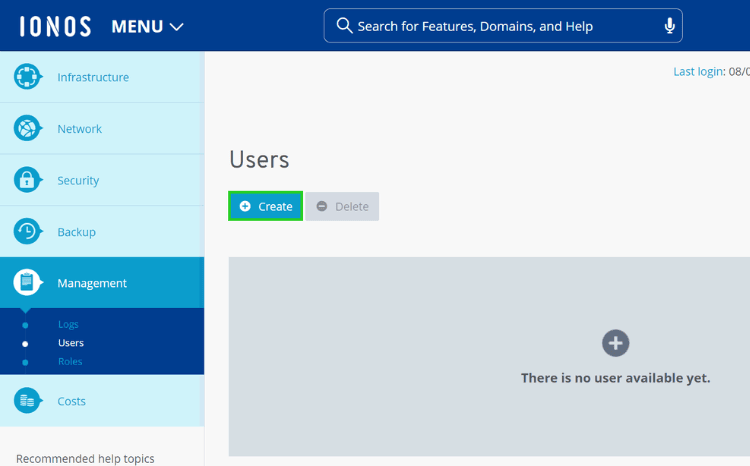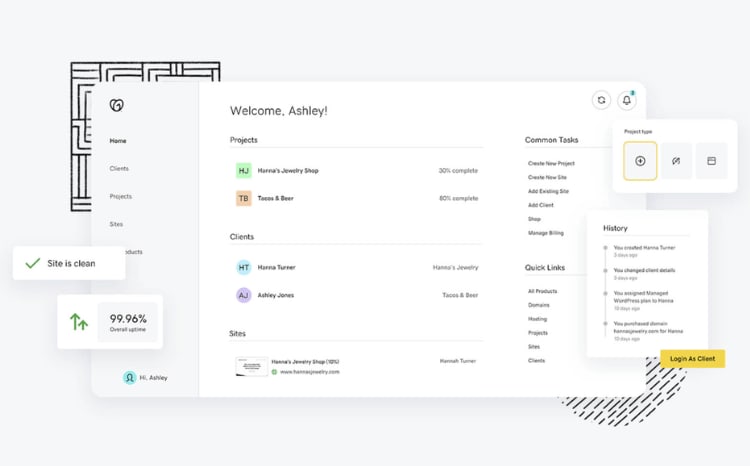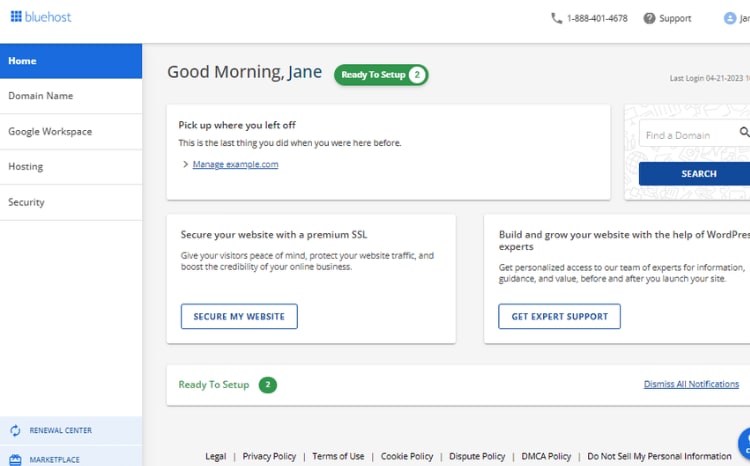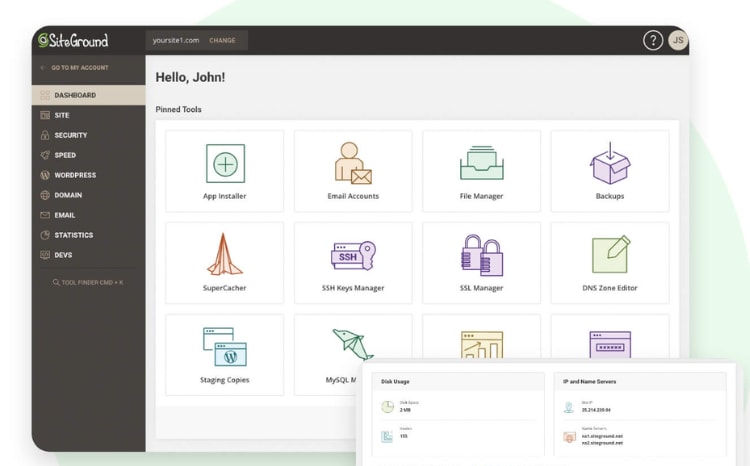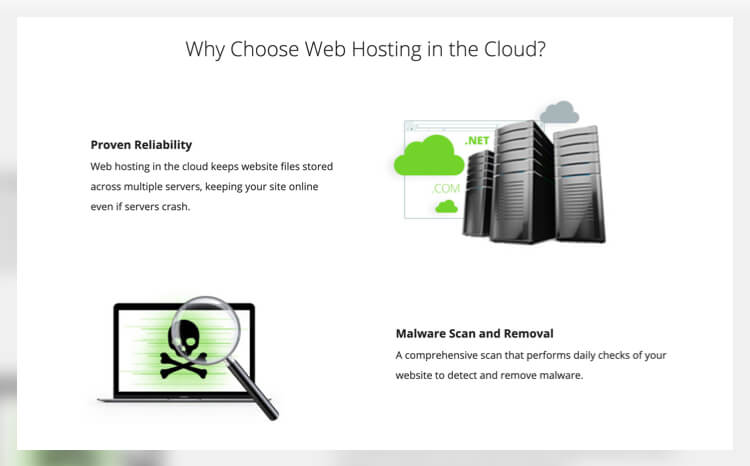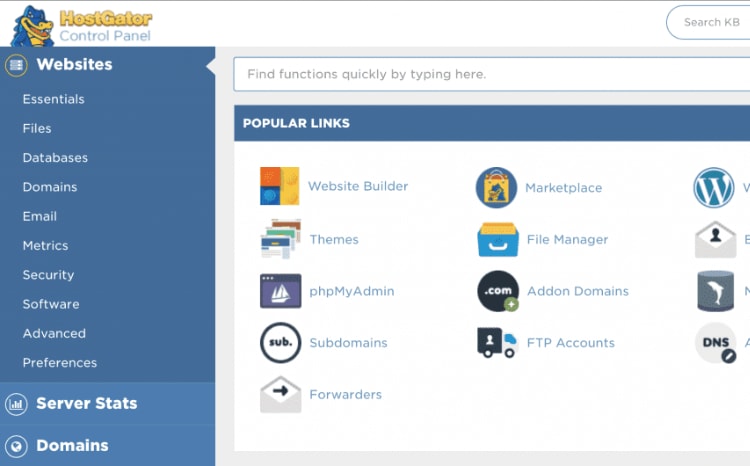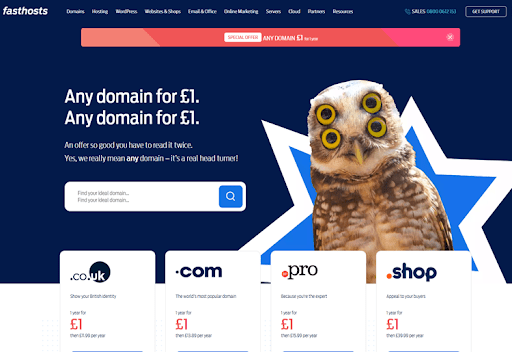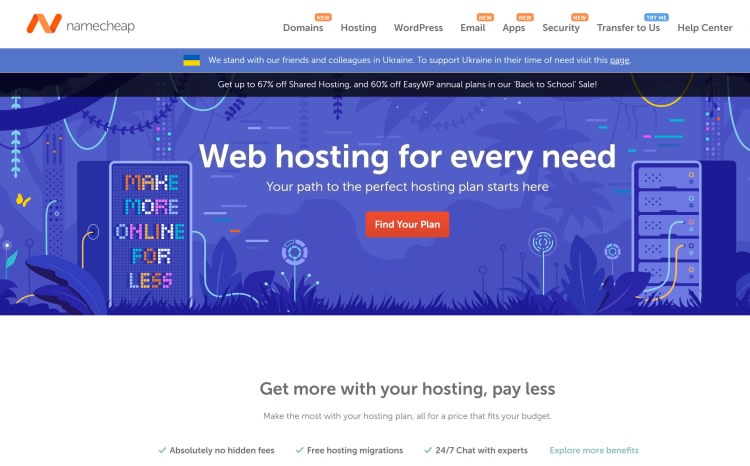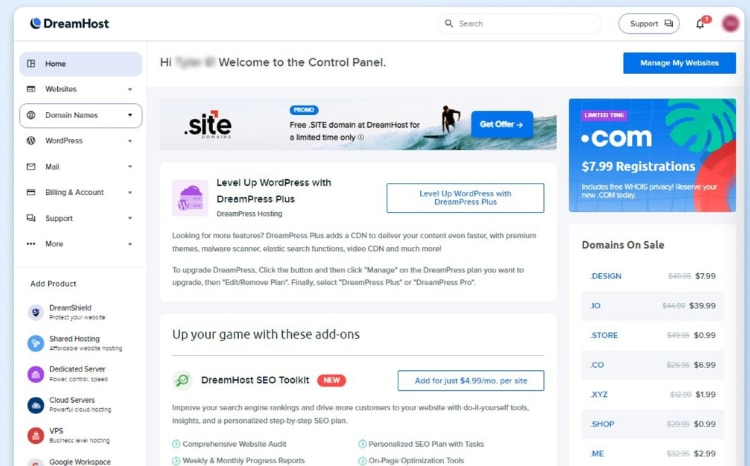What Are Web Hosting Services?
Web hosting services are like the real estate where your website resides. If you have a website, it needs a place on the internet to live, and these hosting services act as landlords, ensuring your site is up and running so customers can access it by typing in your URL.
There are various types of hosting services tailored to different business needs. Some web hosting companies offer comprehensive packages, including website building, marketing, and sales, while others provide just the space, infrastructure, technical support, and equipment for you to create your website independently.
Your choice of a hosting company will depend on your business model and size. By understanding the key terms and features, you can compare options and select the service that best fits your company's needs.
What are the different types of web hosting?
Shared Web Hosting: Affordability and Simplicity
Shared web hosting is the basic package that services offer.
Your website sits on the same server along with many other websites, so you're sharing the server, and any other resources, such as memory or CPU. Shared hosting is good for basic website needs such as email sending, file sharing, and base level e-commerce sites. Shared web host plans are the cheapest and, therefore, smartest option for smaller or startup businesses.
VPS Hosting: Balancing Power and Flexibility
A virtual private server (VPS) provides you with a dedicated portion of a server, giving you more control and resources compared to a shared hosting plan. While you might still be sharing the physical server with others, your virtual server operates independently.
This means you have your own allocated resources, such as memory, storage, and processing power, which aren't affected by other users. VPS hosting offers a safer and more reliable option, keeping your site separate from others, while still being affordable.
Dedicated Web Hosting: Maximum Control and Performance
Dedicated web hosting takes your website hosting to the next level by providing you with an entire server exclusively for your use. This means you have full administrative control, allowing you to configure the server exactly as you need.
With dedicated hosting, you get a comprehensive suite of features, including enhanced security, higher performance, and the ability to handle large volumes of traffic. This level of hosting is ideal for businesses with high resource demands or those requiring specialized server configurations that aren't possible with shared or VPS hosting. However, the extensive features and capabilities may not be necessary for all types of businesses, particularly smaller ones with more modest needs.
WordPress Hosting: Optimized for WordPress Websites
WordPress hosting offers specialized shared hosting plans tailored specifically for WordPress websites. These servers are optimized to enhance performance, providing benefits such as faster load times, easy WordPress installation, and security features designed specifically for WordPress sites. Additionally, WordPress hosting includes automatic updates to keep your site secure and up-to-date.
This type of hosting is particularly useful for businesses that use WordPress to create and manage their websites, as it ensures compatibility and smooth operation, making it easier to maintain and improve site performance.
Cloud Hosting: Great for Diverse Workloads
Cloud hosting uses a network of virtual servers to host websites, ensuring high reliability and scalability. Instead of relying on a single physical server, resources are distributed across multiple servers, allowing for flexible resource allocation and improved performance. This makes cloud hosting ideal for websites with varying traffic levels. The flexibility of cloud hosting supports diverse applications and workloads, making it suitable for various business needs. Additionally, its cost-efficiency with pay-as-you-go pricing models helps in better budget management.
What Is Included With a Web Hosting Service?
With a web hosting service, here are just some of the features you'll get:
- Storage space
- Bandwidth
- Security features
- Control panel
- Domain name registration
- Website builders
- Blogging and eCommerce functions
- Email marketing
- Analytics & reporting
Web hosts centralize everything into one service that will let you launch your site online, maintain its smooth running status, and store data securely.
How Much Does Web Hosting Cost?
Web hosting plans cost between $1 and $6.99 per month. The price depends on your chosen web host service and the features included.
Here, you can find a quick comparison of our Top 10 Hosting Sites based on our research, from least to most expensive:
Web.com
A2 Hosting
Network Solutions
From $1.99/month
From $2.59/month
From $2.75/month
From $2.75/month
From $2.75/month
From $2.99/month
From $3.95 /month
From $5.69/month
From $5.99/month
While you should certainly consider pricing, the best providers offer plans for every budget, and in some cases, signing up for longer subscriptions (rather than paying month to month) will qualify you for extra discounts.
Also, leave some room to grow. Choosing a web hosting plan that meets your website's current needs is great. But with any luck, your site will grow and expand, and your needs may change. Since switching to a new web hosting provider is a major hassle, consider one that offers a wide range of scalable plans.
Factors that Influence Website Hosting Cost
- Type of hosting plan: Shared, VPS, Dedicated, or Cloud Hosting. Dedicated hosting usually ends up being more expensive than VPS or shared hosting.
- Storage: The amount of data storage your hosting plan provides. Larger data storage capabilities usually come at a steeper price point.
- Bandwidth: The volume of traffic your website can handle without interruption or slowdowns. High traffic sites require more expansive plans.
- Number of Websites: Some plans allow you to host multiple websites under one account.
- IP Addresses: Costs may vary if you require a static IP address.
- SSL Certificate: Ensures website security; some plans include it for free, while others may charge extra.
- Customer Support: Availability and quality of support; some offer 24/7 service, while others may charge for premium or dedicated assistance.
- Customization Options: Plans allowing for additional features like databases or web servers typically cost more.
- Scalability: Ability to upgrade or scale resources as needed.
- Security Features: Advanced security measures like DDoS protection.
- Contract Length: Monthly vs. annual billing and any discounts for longer-term commitments.
Essential Web Hosting Features You Need
When choosing a web hosting service, several key features can significantly impact your website's performance and reliability. Here are some of the most important factors to consider:
Uptime Guarantee: Ensuring Reliable Website Availability
When researching web hosting services, you'll often hear about uptime guarantees, and for good reason. Uptime refers to the percentage of time that a hosting service is operational. Companies usually guarantee a certain uptime percentage, ensuring that your website is always available. A high uptime percentage, such as 99% or higher, means your site will be accessible to your customers almost always, preventing loss of traffic and business. Top providers like InMotion Hosting, HostGator, and Bluehost offer excellent uptime guarantees.
Load Time Optimization: Speeding Up Your Website
Load time is crucial for retaining visitors. Studies show that users have short attention spans, so if your website takes too long to load, you risk losing potential customers. Ensure your hosting service provides fast load times. For example, A2Hosting boasts industry-leading load times of around 360 milliseconds, helping keep your audience engaged.
Customer Support: Reliable Assistance When You Need It
Reliable customer support is essential for resolving any issues that may arise with your website. Look for hosting providers that offer knowledgeable, responsive, and easy-to-access support. This ensures that you can quickly get help when you need it, minimizing downtime and keeping your website running smoothly.
Server Location: Choosing the Right Geographical Server
The number and location of servers play a significant role in your website's speed and performance. More servers generally mean better performance, but their geographic location is also crucial. Choose servers located close to your target audience to reduce load times and improve user experience. Depending on your location, look for servers in key areas like the UK or the US.
Email Hosting: Managing Email Accounts with Your Hosting
Email hosting can enhance your business's online presence by providing professional email addresses for your employees. Many web hosts offer email hosting tools that allow you to manage accounts and communications efficiently from one place, helping you maintain a professional image and streamline internal communication.
Security Features to Look for in a Hosting Package
There is plenty that small business owners can do to ensure the safety of their accounts. Check if your hosting provider offers any of the following security tools:
Two-Factor Authentication (2FA): Strengthening Account Security
Also known as multi-factor authentication (MFA), 2FA adds an extra layer of security to the login process. This is especially important for managed hosting plans that use cPanel, as unauthorized access to cPanel can be particularly damaging. Hosting providers offering 2FA for cPanel logins can significantly reduce the risk of unauthorized access and enhance overall security.
Free SSL Certificates: Securing Data Transmission
For businesses operating multiple domain names, free SSL certificates provided by the hosting package are highly beneficial. An SSL certificate, issued by a Certificate Authority (CA), ensures that data transmitted between your website and its visitors is encrypted using Transport Layer Security (TLS). This is indicated by "https://" in the URL. Encrypted data transmission protects your customers' information and secures your digital infrastructure from potential breaches.
DKIM, SPF, DMARC: Enhancing Email Security
Email spoofing poses a significant threat to small businesses. To combat this, look for a hosting provider that offers three key email authentication tools: Domain Keys Identified Mail (DKIM), Sender Policy Framework (SPF), and Domain-based Message Authentication, Reporting & Conformance (DMARC). These tools, configured as DNS records in cPanel, authenticate emails sent from your domain, preventing fraudsters from impersonating your organization.
Easy Update Manager: Streamlining Software Updates
Popular web-hosted scripts, like the WordPress Content Management System (CMS), are common targets for hackers due to their widespread use. An easy update manager allows for one-click script installation and automatic updates. This feature ensures that your web-hosted programs are regularly updated with the latest security patches, reducing vulnerabilities and maintaining site security without needing constant IT intervention.
By ensuring your hosting package includes these security features, you can significantly enhance the protection of your website and customer data.
Other Website Setup Considerations
While providing the basics like bandwidth and disk space are a given, good web hosting plans will also have at least a few extras.
- Website Builders: For easy website creation, choose a host with a website builder. These tools offer templates that you can customize without coding, making it simple to design your site.
- SEO tools and plugins: SEO features provided through a web host plan can significantly enhance your website's visibility and ranking on search engines.
- Ecommerce solutions: If you're running an online store, look for providers that offer Ecommerce solutions. Ensure they support content management systems for easy updates and provide access to site statistics.
- Environmental friendliness: Consider a web host's eco-friendliness. Some providers use green technology to run their data centers, reducing their environmental impact.
- Customer service: Reliable customer service is crucial. Ensure your provider offers 24/7 support through multiple channels like phone, email, and online chat. Look for clear money-back guarantees and check online reviews from actual customers to gauge the provider's reputation.
10 Most Popular & Biggest Web Hosting Services for August
In addition to our picks for the Top 10 best web hosting providers list, we also wanted to check and rank web hosting providers by their website visitors, to determine exactly which ones are the largest.
So, we examined the top 20 most popular websites and narrowed it down to the top 10 websites with the most website visitors in the USA as of May 2024:
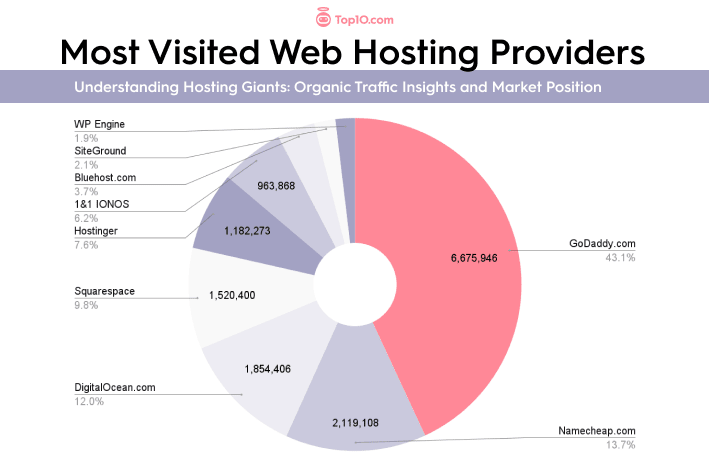
The web traffic can be an interesting set of data to go off of when choosing a web hosting provider, as it may correlate with the size and popularity of the hosting company. Organic traffic indicates how many visitors find the company's website through search engines, which can be a proxy for brand visibility and interest. By analyzing this data, you can better understand which hosting companies are the biggest and most popular, and how their organic traffic correlates with their overall market position.
Source: ahrefs
More Web Hosting Services We Reviewed
We have some good news for you if you feel like your web host search isn't over. Our web host experts went beyond the 10 brands featured and reviewed on this page.
Check out these additional brands to get a better idea about all your web host options:
You May Also Like These Articles
We have you covered, whether you're new to web hosting or are trying to find streamlined ways to improve your existing site setup.
All things considered, take a look at these articles our hosting experts wrote and find the best ways to manage your site online.
- Best Web Hosting for Small Businesses
- How to Choose a Web Hosting Service
- 10 Tips for Determining Your Website's Bandwidth Requirements
- Our Essential Guide to Shared Web Hosting
- The Best WordPress Hosting Services
Bottom Line: Make an Informed Decision for Your Web Hosting Needs
Our picks for the top 10 best web hosting services are Bluehost, IONOS, HostGator, Hostinger, DreamHost, A2 Hosting, Web.com, Network Solutions, rocket.net, and InMotion. As tempting as it may be to choose a web hosting provider quickly and get on with your business plans, it's undeniably better to take your time. In doing so, you'll be able to find a provider you can stick with for the long haul.
Yes, some web hosting services do include a website builder, but not all of them. The hosts listed in this review, however, have WordPress hosting plans. WordPress is a CMS (an application used to create, edit and publish websites) with hundreds of free templates available so that anyone can easily build their own site.
Yes, for most people, the web hosting service does make a difference. If you only need a few static pages (or simple "coming soon" placeholder pages), any web hosting service will work. But if you want a more modern, dynamic website, consider the features provided by the top hosting services outlined in this article.
While it's arguably possible to do so, self-hosting a website requires technical expertise, hardware, and server space. Even with these, a self-hosted site won't deliver the performance or resiliency of one that's hosted by a professional service. For example, if you get a lot of visitors or your internet connection fails, your website will be unavailable.
A web host is a company that provides the servers your website lives in, so visitors can access it through their internet connection. A web builder is an online internet application that helps you create a website, which you then upload to a hosting server when it's ready to "go live" online. Some web hosts include web builders, but you don't need to use them. Experienced web developers can build their own websites, while others may choose a CMS like WordPress.
There are generally four major types of hosting services: shared, dedicated, VPS, and cloud. Most providers offer shared and dedicated hosting plans for both WordPress and custom sites. Others include additional hosting services, like managed hosting, cloud hosting, VPS, and reseller hosting.
Our research determined that GoDaddy, IONOS, A2 Hosting, and Rocket.net offer the most robust security. Look at secure web hosting from two perspectives: the host's own security, and the security tools they provide for you to use. The first is difficult to compare, as hosts generally don't publish information on the security measures they have in place at their data centers. But the second can be explored by looking at what hosts include in their plans.












